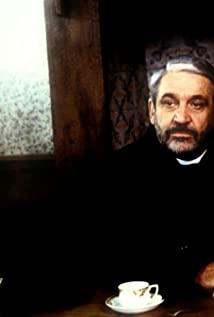Maurice Piara is an actor turned director. He is also a painter. Although his reputation is not first-rate, critics agree that he is a serious director who pursues absolute truth. Throughout his films, there is an air of serenity that is turbulent and disturbing. Piara believes that people's inner world is always full of hesitation, hesitation, self-blame, regret, hope and joy. Joy and expectation are often short-lived, while hesitation and disappointment are always long-lasting. There is always a struggle between good and evil in human hearts. Father Dounisan pursues absolute goodness, idealized goodness or some kind of mythical goodness that cannot exist in the world. In this film, Piara strives to reveal that the young priest, in order to achieve a perfect state, always drives away all kinds of evil thoughts brought to him by the devil. While praying, his mind was still attacked by the various evil thoughts released by the devil. He did not hesitate to beat himself with a leather whip in an attempt to drive away the ghosts stationed in his body. As a result, Satan still had the upper hand.
When Father Segley sent him to a remote mountain village in northern France, although he was wearing the old priest's overcoat to resist demons, he still encountered Satan dressed as a tramp. He was taken to spend the night in a shabby room where the devil often led astray, and his sexual harassment made his already restless heart even more turbulent, and he almost lost control of himself and fell into Satan's trap. The next day, he walked to the small village alone, and when passing through the woods, he encountered Satan's incarnation, Mu Sha Xun. The devil brought up the sins he committed before stepping into the empty door, and Donisan's already turbulent mind completely lost its balance. So he made an extremely stupid mistake, which led to Mu Sha's suicide. This incident made Donisan even more doubtful about his ability as a clergyman to fulfill the mission of saving the souls of the world, and he felt even more uneasy in his heart.
When he was sent to serve in the Rumble Chapel, this impoverished mountainous area with simple folk customs may be a place where Satan's sunshine cannot shine. Donisan worked hard with his mind and muscles to spend all his energy on rebuilding the collapsed chapel. Satan the Devil seemed to exclude the boundary of the collapsed church from his territory, so Donisan's spirit was at peace for a moment. But his years of misery had left him with heart failure. When he was called to save the soul of a dying boy, in a dark house where the devil's light could not reach, he prayed to God to use his soul to save the child's life, and he performed a miracle, the dying The child opened his eyes. The child's mother was grateful to him. But Donisan was still worried that Satan was not far away, and he even thought he had seen the devil. As he trudged back to his church, he died in the confessional due to overwork. As Father Segley closed his eyes for him, he prayed that his restless soul would be saved.
Director Maurice Piara uses a large number of close-ups and monophonic large inner monologues, using realism and even naturalism to reveal the inner world of a rural priest. Compared with the film "Diary of a Country Priest" directed by Bresson, although the subject matter and style are similar, the difference is that in Piara's film, people can't find the grace and grace of God. forgive. Therefore, the audience feels sympathy for Donisan's inner contradictions. The young priest who gave his life as a martyr was both respectable and pitiful. It is obvious that the world Donisan observes from his quest for perfection is markedly different from that of the worldly man. Even devout believers who believe in the doctrine will not plunge their souls into the abyss of inextricable pain through atonement and repentance.
After the awards ceremony at the Cannes Film Festival, a reporter asked the director who pursues a high degree of realism: "In today's society, you put this work of George Bernanos on the screen and reproduce it realistically. The tragedy of a martyr, what is your true intention?" Maurice Piara answered without hesitation: "Dawnissan's tragedy touched me deeply. I share his belief that God is always and everywhere, Satan is also everywhere. But in today's sinful world, Satan's sunshine is shining on the earth, and the mission of saving the souls of the world is getting more and more difficult. Our society urgently needs more martyrs like Donisan. That was my motivation for adapting Bernanos's work."
Another reporter once asked Piara: "Why don't you make love-themed movies? It seems that you have a soft spot for people with suppressed emotions like Donisan, isn't that so?" Insightful talk: In the field of art, whether it is poetry, novels, paintings, plays or movies, people always say: Love is an eternal theme. In the past, people regarded love as sacred and sang great love. From the Greek tragedy "Andromache" to Shakespeare's "Romeo and Juliet", the love of life and death is really unforgettable. Why is this love story so popular? Because love that transcends life and death, pure love, sincere love is real, and this kind of love that ignores life and death is indeed worthy of praise. However, the description of love in many works of later generations has completely become an opportunity to describe social customs, and the focus is no longer on the love between men and women, which is of course a reflection of the reality of social development. With the continuous development of productive forces, people's material living standards are getting higher and higher, more and more materialized content in society, and less and less spiritual things. In our post-industrial society today, where everyone is striving for as much material enjoyment as possible, noble and pure love no longer exists. If a director comes up with a story like Edward the King of England does not love the country and the beauty, I guarantee that no one will watch it, because the fairy tale of Prince Charming falling in love with a shepherdess is not loved by children. Although novels and movies still always tell love stories that are far from noble and pure, this is because in interpersonal relationships, the love between men and women is the warmest and most likely to arouse people's interest, because it is a part of life, and the world is also easy to understand. It is convinced. But in fact, I think there is no pure true love in the world except family love. It can even be said that love is the most unbelievable thing, because there are too many materialistic and carnal desires behind it. As a serious artist who writes love stories as pure and noble as they used to be, he knows that this self-deception game is purely for money, because he knows it can't be true, and he risks not being considered any more It's the biggest risk for serious artists, so I'm not planning on making films on this subject just yet. For figures like Donisan, although religious beliefs suppressed his emotions, he chose this pure and noble path himself, and he also fought hard for his beliefs, so his sacrifice was worthwhile. is great. For this kind of true and believable stories, it can be said that I have a soft spot for it. If the romance between Mu Shaxuan and the Marquis of Cardignan or the congressman who is a doctor is made into a so-called love story, unless the devil Satan has fascinated me, Let me insert some nudity and bed scenes, sprinkle some salt and pepper, and maybe the attendance will not be bad, because I know it's pure nonsense, so I will never accept such so-called love movies. Mushaxin is the incarnation of Satan. The marquis regards property as the supreme, and the congressman regards reputation as the highest. The two people's feelings for Mushaxin are only temporary sensuality at best, not even sex, and love is even more irrelevant. related. Therefore, I think the definition of this eternal theme should be re-discussed.
This film by Maurice Piara won the Grand Prix at the Cannes International Film Festival and was highly praised by academic film critics, but it was difficult for young audiences to accept because of its subject matter and too many metaphors of religious background. , felt tedious and convoluted, so it was not commercially successful.
View more about Under the Sun of Satan reviews











